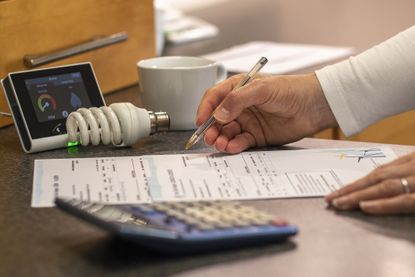Energy companies told to take urgent action over the handling of customer direct debits
Energy regulator Ofgem has told a number of energy suppliers to take action over customer direct debits, after a review found a range of weaknesses and failings at some firms. Here’s what it means for your gas and electricity bill


Energy companies have been told to take immediate and urgent action over how they handle customers’ direct debits, following a review by the energy regulator, Ofgem, which found a range of weaknesses and failings at a number of suppliers. The review follows a number of complaints about higher than expected direct debits after the latest energy price cap came into play.
The review means over 500,000 customers who saw their energy bill direct debit shoot up by more than 100% between 1 February and 30 April 2022 will have their bill reviewed immediately.
We explain which energy companies were found to have severe weaknesses in their handling of direct debits, what action they must take and how this impacts your bill.
Ofgem looked at the practices of 17 suppliers, and although the majority had only minor issues, six were found to have severe or moderate weaknesses.
WHAT HAS OFGEM ASKED ALL ENERGY SUPPLIERS TO DO AND WHAT DOES IT MEAN FOR YOU?
All suppliers that increased their customers’ direct debits by more than 100% between 1 Feb and 30 April 2022 must now review them and assess if they were fair. Ofgem said it was concerned by this level of increase and wants to ensure there is a good reason for the 100% increase - for example, if a customer came off a fixed deal or had significantly increased their energy usage.
This means over 500,000 customers who saw their energy bill direct debit shoot up by more than 100% will have their bill reviewed immediately.
Ofgem stressed that it is up to suppliers to ensure that direct debits are set correctly based on all the relevant information available.
Look After My Bills Newsletter
Get the best money-saving tips, tricks and deals sent straight to your inbox every week. Make sense of your money in partnership with The Money Edit.
Jonathan Brearley, Ofgem CEO, said: “We know how hard it is for energy customers at the moment, so it’s crucial that the amount they pay each month in direct debits is right so they can manage their money.
“Suppliers must do all they can, especially during the current gas crisis, to support customers and to recognise the significant worry and concern increased direct debits can cause.”
He adds: “It’s clear from today’s findings on direct debits that there are areas of the market where customers are simply not getting the service they need and rightly expect in these very difficult times.
“Today’s findings show that with the urgent changes we are now expecting, the current system will be much fairer for consumers. Bringing down the price of gas is not in Ofgem’s control; however, we will do all we can to have a fair system and ensure suppliers look after their customers.”
Ofgem has also asked suppliers to adjust any miscalculations, make repayments if needed, and even consider a goodwill payment if it is warranted.
Suppliers must also address their processes that have led to customers over or under paying for gas and electricity.
Ofgem has also asked that energy companies plan for the October energy price cap to ensure customer direct debits are appropriate and communicated clearly and do all that they can to ensure customers understand their payments for gas and electricity.
WHICH SUPPLIERS HAVE BEEN FOUND TO HAVE INADEQUATE PROCESSES?
Here are the suppliers found to have ,’moderate’ to ‘severe’ weaknesses:
- Ecotricity
- Good Energy
- Green Energy UK
- Utilita Energy
- TruEnergy
- UK energy Incubator HUb (UKEIH) (this supplier has ceased to trade since Ofgem’s findings, but we have listed it for your information)
These suppliers were found to have inadequate processes, weak governance and controls and an overall lack of a structured approach to setting customer direct debits.
Ofgem said it was concerned that in some cases this would lead to customer direct debits being set incorrectly, or not evaluated for a long time which would result in a buildup of credit or under/overpayments.
TruEnergy and UKEIH had no consistent or structured approach to setting customer direct debits; Ofgem said it has severe concerns over the maturity of their processes, which put customers at serious risk of inconsistent or poor outcomes. Ofgem said rapid action is needed and is considering whether enforcement action is warranted.
Since UKEIH has ceased trading, Ofgem will be taking no further action with that supplier.
Here are the suppliers found to have ‘minor’ weaknesses:
- Bulb
- E.ON
- Octopus Energy
- Outfox the Market
- Ovo
- Shell
- Utility Warehouse
Ofgem said these suppliers have ‘gaps in their processes’, examples of which include lack of documented policies and guidance for staff, potentially not taking into account all the relevant factors when setting direct debits and risks that some customers’ direct debits are not assessed properly.
Ofgem has started a compliance engagement process with these suppliers to work towards improvements.
These suppliers were listed with ‘no significant issues’:
- British Gas
- EDF
- ScottishPower
- SO Energy
Ofgem said these suppliers have robust processes in place, but said it has made recommendations for improvements.
WHAT CAN I DO IF I BELIEVE MY DIRECT DEBIT IS TOO HIGH?
If you think your energy direct debit may have been increased to an unfair level, get in touch with your energy supplier first and ask for an explanation and a review.
If you are still not happy, you can get advice from Citizens Advice for free on 0808 223 1133.
Read how one reader managed to bring her bill back down, with The Money Edit’s help, after her energy provider increased her direct debit by a whopping 215%.
Read also how The Money Edit’s Guy Anker fought back when his direct debit went up from £46 a month to £116 a month.

Kalpana is the Digital Editor of sister site MoneyWeek.
She’s an award-winning journalist and author of Invest Now: The Simple Guide to Boosting Your Finances and a children's book Get to Know Money - with extensive experience in financial journalism. Her work includes writing for a number of media outlets, including national papers and well-known women’s lifestyle and luxury titles, where she was finance editor for Cosmopolitan, Good Housekeeping, Red and Prima.
She started her career at the Financial Times group, covering pensions and investments.
As a money expert, Kalpana is a regular guest on TV and radio; appearances include BBC One’s Morning Live, ITV’s Eat Well, Save Well, Sky News and Channel 5's 30 money saving tips series.
She was also the resident money expert for the BBC Money 101 podcast.
A well-known money and consumer journalist, Kalpana also often speaks at events.
She is passionate about helping people be better with their money, save more and be smarter spenders.
Follow her on Twitter and Instagram @KalpanaFitz.
-
 Three energy firms pay £8m in switching compensation - has your provider paid out?
Three energy firms pay £8m in switching compensation - has your provider paid out?More than 100,000 customers have received compensation after changing providers, but is now a good time to switch energy suppliers?
By Tom Higgins Published
-
 Save £300 on your supermarket shop with cashback accounts
Save £300 on your supermarket shop with cashback accountsBanks, credit card companies and cashback sites are all offering cashback on your supermarket shop, but can you use them all to max out your savings?
By Vaishali Varu Published
-
 Three energy firms pay £8m in switching compensation - has your provider paid out?
Three energy firms pay £8m in switching compensation - has your provider paid out?More than 100,000 customers have received compensation after changing providers, but is now a good time to switch energy suppliers?
By Tom Higgins Published
-
 HMRC tax credit renewal packs: act quickly to avoid losing benefit payments
HMRC tax credit renewal packs: act quickly to avoid losing benefit paymentsHouseholds receiving tax credits will be asked to confirm their details to ensure they continue to receive their entitlement. Here’s everything you need to know to make sure you don’t miss out on up to £3,480 a year
By Tom Higgins Published
-
 Mobile provider rewards: how to earn up to £700
Mobile provider rewards: how to earn up to £700Your phone could be the key to unlocking hundreds of pounds worth of discounts and freebies that you don’t even know about. We reveal which mobile providers offer the best rewards
By Vaishali Varu Published
-
 How much do cooking appliances cost to run?
How much do cooking appliances cost to run?Energy-saving cooking tips from the Energy Saving Trust
By Katie Binns Published
-
 Virgin Media leaves thousands without broadband: are customers entitled to compensation?
Virgin Media leaves thousands without broadband: are customers entitled to compensation?Tens of thousands of Virgin Media customers were hit by broadband outages yesterday. We explain your rights if your broadband goes down
By Katie Binns Published
-
 Broadband switching service delayed - how it will eventually work and why it’s crucial to switch
Broadband switching service delayed - how it will eventually work and why it’s crucial to switchA broadband switching service designed to make it easier to change to a cheaper or faster deal has been delayed. We explain how you can still avoid huge increases to your monthly internet bill
By Katie Binns Published
-
 Heat pumps: why you can claim a £5,000 government grant for longer
Heat pumps: why you can claim a £5,000 government grant for longerWhy you now have more time to apply for a government grant towards getting a heat pump in your home
By Sue Hayward Published
-
 British Gas cuts energy bills by £15 for prepayment meter customers from April
British Gas cuts energy bills by £15 for prepayment meter customers from AprilOne million British Gas customers on energy prepayment meters will save around £15 as British Gas cuts its penalty three months early
By Sue Hayward Published